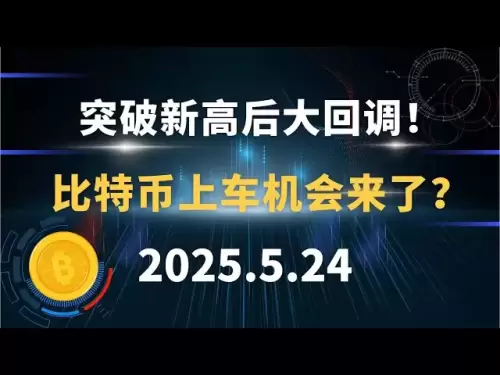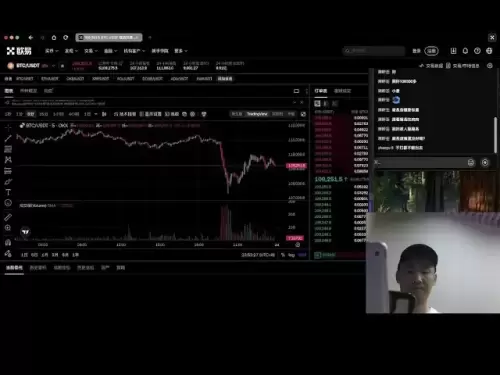 |
|
 |
|
 |
|
 |
|
 |
|
 |
|
 |
|
 |
|
 |
|
 |
|
 |
|
 |
|
 |
|
 |
|
 |
|
Solana Foundationの非シーフマーケティング責任者であるAkshay BDによると。 Accelerate 2025 Conferenceのパネルで、Akshayはブロックチェーンテクノロジーがこれらの欠点に対処するのに役立つと主張しました
Non-chief marketing officer at the Solana Foundation Akshay BD argued that the current structure of capital markets isn't serving a broad base of investors, especially as
Solana Foundation Akshay BDの非チーフマーケティング担当官は、資本市場の現在の構造は、特にとして幅広い投資家にサービスを提供していないと主張しました。
Optimism towards a 60-40 portfolio isn't working in a long time and younger investors are struggling to keep up with older generations who managed to purchase property early and benefitted from rising asset prices, while also having time in the market on their side.
60-40のポートフォリオに対する楽観主義は長い間働いていません。若い投資家は、早期に不動産を購入することができ、資産価格の上昇から恩恵を受け、市場に時間を費やした高齢の世代に追いつくのに苦労しています。
"You have low bond yields, you have asset price bubbles, and people don't really know how the traditional asset allocation model works anymore. The 60-40 portfolio hasn't delivered consistent returns in a long time, and there's a growing sense of uncertainty among investors. Investment managers are reporting that clients are feeling more anxious and burnt out, especially the younger generation who feel like they're starting the game later and have less time to recover if things go wrong.
「債券利回りが低く、資産価格のバブルがあり、従来の資産配分モデルがどのように機能するかを人々は本当に知りません。60-40ポートフォリオは長い間一貫したリターンをもたらしていません。投資マネージャーは、クライアントがより不安と燃え尽きていると感じていると報告しています。
"And a lot of this tension is due to a widening gap between the income earned through wages and wealth accumulated through asset ownership. Retail investors are largely locked out of private markets, which are typically accessible only to accredited investors, a dynamic that may be contributing to overheated public markets.
「そして、この緊張の多くは、賃金と資産所有を通じて蓄積された富を通じて得られる収入との間のギャップが拡大しているためです。小売投資家は、一般的に認定された投資家のみがアクセスできる民間市場から締め出されています。
"This tension will only escalate with the rapid advancement of artificial intelligence, which could further deepen existing economic divides. So the question is, which way do we go? Is it ... universal basic income, where we're essentially creating a welfare economy to support those unable to keep jobs or own assets? Or is it what we propose, universal basic ownership, where everybody with a mobile phone can own assets?"
「この緊張は、人工知能の急速な進歩によってのみエスカレートします。これは、既存の経済的分裂をさらに深める可能性があります。ですから、問題は、どのように進んでいますか?それは...普遍的なベーシックインカム、私たちは基本的に雇用を維持できない人や自分の資産を支援するために福祉経済を創造しますか?
In the Solana ecosystem, the "Non-Chief Marketing Officer" (nCMO) is a role within the Solana Foundation that focuses on supporting the Solana community's marketing efforts. It seems that Akshay is focused on highlighting the potential of blockchain technology to help address these shortcomings, saying that Solana could "make everyone an investor or a dreamer over time."
Solana Ecosystemでは、「ノンチーフマーケティングオフィサー」(NCMO)は、Solanaコミュニティのマーケティング活動をサポートすることに焦点を当てたSolana Foundation内の役割です。 Akshayは、これらの欠点に対処するためのブロックチェーンテクノロジーの可能性を強調することに焦点を当てているようです。
This would involve crypto infrastructure facilitating broader asset ownership, allowing individuals to invest in anything they wish, from energy companies to local coffee shops, through tokenization.
これには、より広範な資産所有権を促進する暗号インフラストラクチャが含まれ、個人がエネルギー会社から地元のコーヒーショップまで、トークン化を通じて希望するものに投資できるようにします。
"We can create a world where people can invest in anything they care about, whether it's a solar energy company or a coffee shop down the street. Imagine scanning a QR code on a coffee cup to invest in the local roastery or a restaurant that serves amazing food. This isn't science fiction; we have the technology to do this today.
「太陽エネルギー会社であろうと通りのコーヒーショップであろうと、人々が気にするものに投資できる世界を作ることができます。コーヒーカップでQRコードをスキャンして地元のロースターに投資したり、素晴らしい料理を提供するレストランに投資したりします。これはサイエンスフィクションではありません。
"We're not limited to investing in large, publicly traded companies. We can invest in anything we choose, and we can do so in small increments that fit our own budgets. This opens up possibilities that weren't available before. People can become owners of the companies and organizations that they use and support daily."
「私たちは、大規模で公開されている企業への投資に限定されていません。選択したものに投資することができます。自分の予算に合った少しずつで行うことができます。これは以前に利用できなかった可能性を開きます。人々は毎日使用およびサポートする企業や組織の所有者になることができます。」
According to Akshay, this could help combat the overheating of certain markets, a lofty goal that some sectors of crypto, like RWA tokenization, aim to facilitate. Akshay noted that some entrepreneurs had tried this before, but the available technology didn't support this view.
Akshayによると、これは特定の市場の過熱と戦うのに役立つ可能性があります。これは、RWAトークン化のような暗号化の一部のセクターが促進を目指しているという高尚な目標です。 Akshayは、一部の起業家が以前にこれを試したことがあると述べたが、利用可能なテクノロジーはこの見解をサポートしていなかった。
"People have tried to do this before, but the technology wasn't there yet. They envisioned a world of modularity and fluidity, but they couldn't quite achieve it. But now, with the dawn of Web3, we can finally realize these ambitions. It starts with the game, and very quickly becomes interesting, but it's also economically efficient.
「人々は以前にこれをしようとしましたが、テクノロジーはまだそこにいませんでした。彼らはモジュール性と流動性の世界を想像していましたが、それを達成することはできませんでした。
"What it gives you is the ability for you to financialise all the productive assets in an economy, so you can have anybody who participates in that economy be an owner of that economy. It’s efficient in terms of capital allocation because capital flows to the best opportunities, and it creates a more engaged and invested society, where people feel a sense of belonging and contribution."
「それがあなたに与えているのは、経済のすべての生産的な資産を財政化する能力です。そのため、その経済に参加する人はその経済の所有者になることができます。資本が最高の機会に流れ込み、人々がより熱心で投資された社会を生み出し、貢献の感覚を感じるため、資本配分の点で効率的です。」
According to data from market analytics firm Multpl, the S&P 500's price-to-earnings (P/E) ratio has consistently remained above 19.6 since December 2018, higher than the index's historical average P/E ratio of around 16.1 and suggesting that investors have been willing to pay a premium for earnings in recent years.
市場分析会社Multplからのデータによると、S&P 500の価格対稼ぎ(P/E)の比率は、2018年12月以降19.6を超えていたままであり、インデックスの歴史的平均P/E比率は約16.1よりも高く、投資家が近年の収益のためにプレミアムを支払う意思があることを示唆しています。
Zooming out, the S&P 500's average valuation has been gradually rising for decades, driven by factors such as low interest rates, growing corporate gains, and investor optimism about technology. However, high valuations have also coincided with periods of market corrections, like the dot-com crash and the 2008 financial crisis after the collapse of the subprime mortgage market.
ズームアウトすると、S&P 500の平均評価は、低金利、企業の利益の増加、テクノロジーに関する投資家の楽観主義などの要因に起因する数十年にわたって徐々に増加しています。ただし、高評価は、Dot-COMクラッシュやサブプライム住宅ローン市場の崩壊後の2008年の金融危機などの市場修正期間と一致しています。
免責事項:info@kdj.com
提供される情報は取引に関するアドバイスではありません。 kdj.com は、この記事で提供される情報に基づいて行われた投資に対して一切の責任を負いません。暗号通貨は変動性が高いため、十分な調査を行った上で慎重に投資することを強くお勧めします。
このウェブサイトで使用されているコンテンツが著作権を侵害していると思われる場合は、直ちに当社 (info@kdj.com) までご連絡ください。速やかに削除させていただきます。





























































